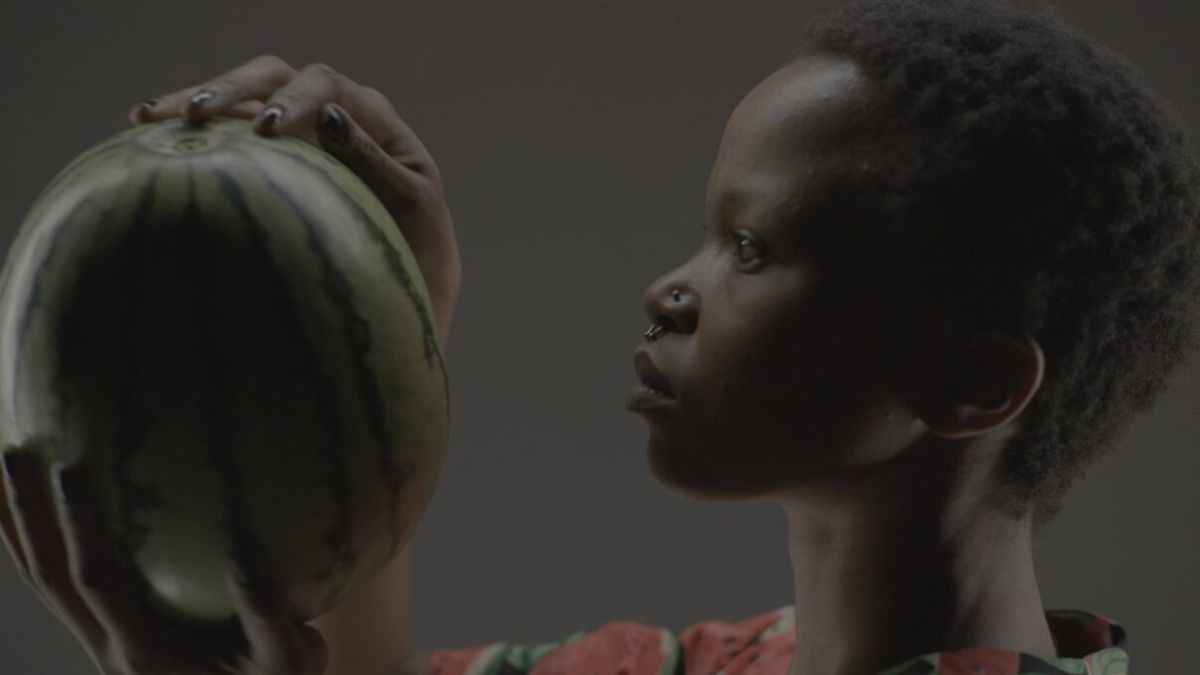Review: As British as a Watermelon

My name is Mandla.
It means power.
I gave it to myself.
The set consists of a square space delimited by white lights. On the edge of the square downstage is a frame representing a door. In the middle of the square, there is a table, with various tools, a stool and about nine watermelons scattered around the space. A simple yet artistic space which perfectly reflects the shadows of a home that is never truly there.
An actress, wearing a dress with a watermelon print, enters stage right holding a watermelon and a knife in her hand. She comes in the square through the door as she mumbles a prayer: “We forgive those who trespass against us (…) we forgive”. She introduces herself as Mandla and concludes her introduction by stating that she is “a little bit psychic and [she] have risen from the dead”.
An unnerving way to say hello if I’ve ever seen one.
Mandla Rae’s performance is centered around her search for identity, whether through God, family, scars, language, truths or lies: she is here to seek her own truth.
As she tells her tales and recites her poetry, she destroys the watermelons, one by one, using a different tool each time and often finishing their destruction with her bare hands.
Throughout the performance, she shares with the audience her visible and invisible scars and the stories behind them. She talks about her obsession with them, how they are faint but always there, and how they become part of who we are.
She talks about what she was taught, and what she learned through her experiences. She associates the rift between her and God with the rift between her and her family. While she exclaims how “God has been a sh*t father to [her]”, she also mentions how her grandma would tell lies and would threaten her when she called them out saying that “it is rude to disagree with your elders”.
Mandla invites the audience into her story, she makes you feel included, looks at you in your eyes. You feel attracted by her energy, mesmerised by her stories – she shares how, as a little girl, she was forced out of her country into the hands of other people she was suddenly meant to call her parents. She explains how she had no idea she had come illegally, how terms like ‘deported’ or ‘detained’ meant nothing to her, how she was old enough to understand her change in circumstance but not old enough to grasp the extent of it. She talks about her blackness, how people were constantly impressed at her English, how her new ‘parents’ beat her, how she told a teacher through an essay, how that teacher got fired.
The stories are short, the transitions too. They’re punctuated by poignant poetry and murmured gospel-like songs. She talks about one thing, then another, barely giving you the time to ponder on the reality of what she’s saying.
She questions herself, others, her past, her future, her environment. She asks big questions, ones that seem impossible to answer: How do you know that you’re gay? Why would one want to stay in a country where one has suffered so much? Why does she love the English language, the language of her colonial oppressor? As she puts into question her experiences and her thoughts, the audience is pulled into her questioning as well.
While the play is barely an hour long, Mandla’s performance is nothing short of powerful and is incredibly captivating. Maybe it’s because of the unnerving way she handles tools? Maybe because of the concerning stories she tells? Probably because of both.
The show plays on senses, she talks about how her “memory is a long lost appetite”, which is reflected in her linear destruction of watermelons throughout the play. She uses a food but inflicts wounds on it, perhaps in order to gain a sense of her own pain and reconstruct a lost memory scattered in a million pieces.
While one wouldn’t think that watermelons have a particularly pungent smell, their scent increasingly envelops the theatre as she destroys them. The smell increases and comes to a climax at the end of the play. This was incredibly special as one isn’t used to using their sense of smell during a theatre performance. It was an original and pleasant surprise which definitely has the advantage of leaving your audience with a special olfactory reminder of your play.
One thing is certain: if you go see Mandla Rae you’ll leave the theater a new person, one that asks questions, one that pays attention to scars, and one who vividly remembers the smell of watermelons.
Note: As British as a Watermelon was previously performed at Hope Mill Theatre as part of TURN ON FEST. It was reviewed by Claudia Langley-Mills.







